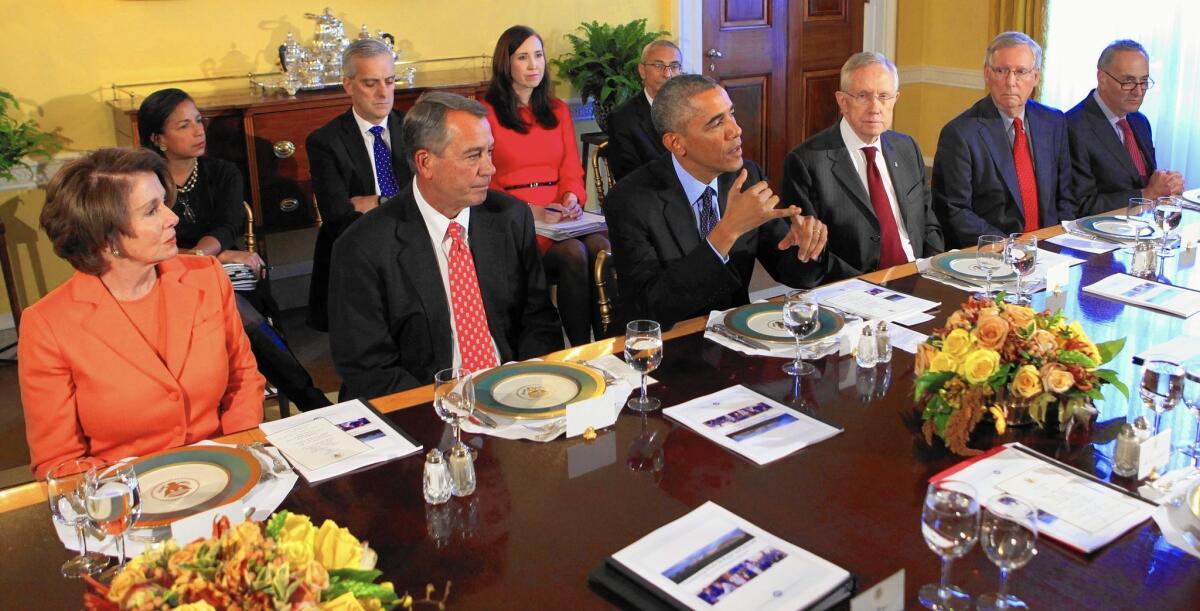Republicans in Congress poised to clash with Obama over environment

- Share via
Reporting from WASHINGTON — Despite postelection nods toward cooperation, Republicans, who will hold the majority in Congress next year, appear poised to clash with President Obama over a range of energy and environmental issues, including the controversial Keystone XL pipeline and important rules addressing climate change, smog and water pollution.
Congressional Republicans have long argued that environmental regulations kill jobs and that fossil fuel development, especially on federal lands, should be expanded.
Now they are in a position to blunt the administration’s regulatory efforts on the environment while accelerating their own projects, such as the proposed extension of the Keystone XL pipeline, which has been criticized as environmentally unsound.
Sen. Mitch McConnell (R-Ky.), expected to ascend to majority leader after winning reelection in part because of success in Kentucky coal country, told the Lexington Herald-Leader that his top priority would be “to try to do whatever I can to get the [Environmental Protection Agency] reined in.”
Business allies predict that Republicans will rely on their oversight authority of the EPA, new legislation and inserts into unrelated must-pass bills to try to compel the president to accept their agenda.
If Republicans attach measures that would block or change environmental rules to budget proposals or other major legislation, the president “would be then confronted with a choice,” said Scott Segal, a lobbyist for the energy industry in Washington. “‘Do I essentially shut down the EPA or do I work with Republicans in the House and in the Senate to reform my proposal?’”
It remains unclear how Obama would respond to such tactics, though he has signaled since the election that he won’t change his strategy for dealing with Congress. He has had advanced his environmental agenda through executive orders and agency rule-making.
Given what momentum the administration has on its environmental priorities, it has little incentive to back away from them, environmentalists said.
“In previous fights, the president has made it clear he will not be cowed by people trying to load up spending bills with provisions the public doesn’t support,” said David Goldston, lobbyist for the Natural Resources Defense Council. “In the past, the White House has stood up to that, and we are confident they will again.”
The president has made global warming, in particular, a priority as he tries to shape his legacy, and the EPA’s limits on heat-trapping emissions from cars and power plants are the most sweeping steps taken by any country to combat climate change.
Further, the United States’ aggressive greenhouse gas reductions might give it the credibility to nudge other nations, especially China, to craft a meaningful international agreement to reduce emissions, analysts say.
A Paris meeting in December 2015 is supposed to yield a formal agreement among polluting nations, and the window is closing fast for governments to make the emissions cuts needed to avert the worst damage expected later this century, a United Nations-backed panel of hundreds of scientists warned recently.
The sense of urgency among international climate negotiators and the White House is likely to be slowed by the new Congress. For starters, the senator in line to be chairman of the Environment and Public Works Committee, James M. Inhofe (R-Okla.), has called climate change “the greatest hoax ever perpetrated on the American people” and dismissed the U.N. science panel as “a front for the environmental left.”
Republicans will attempt to set aside the administration’s power plant rule entirely, Segal said, but short of that, Inhofe and other Republican committee chairs will probably turn to their oversight authority, including holding hearings and issuing subpoenas, to pare the EPA’s emissions limits for power plants.
McConnell and House Speaker John A. Boehner of Ohio have said a Republican-led Congress would pass a bill to approve the Keystone XL pipeline from Canada to Nebraska. Because the pipeline crosses a U.S. border, it requires review by the State Department and a permit, which Obama has said he would decide himself whether to issue.
White House Press Secretary Josh Earnest declined to say whether Obama would veto a bill circumventing the ongoing State Department process. After the election, Obama said he would let the process “play out.”
Republicans are also expected to try to nix an EPA proposal that seeks to define the types of bodies of water that could be regulated under the Clean Water Act. The definition was more expansive during the Reagan administration but cut back sharply under President George W. Bush. The agriculture industry and congressional allies have railed against the proposed rule, arguing that it would allow the EPA to regulate puddles.
More to Read
Get the L.A. Times Politics newsletter
Deeply reported insights into legislation, politics and policy from Sacramento, Washington and beyond. In your inbox twice per week.
You may occasionally receive promotional content from the Los Angeles Times.











